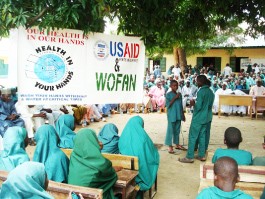Home » WOFAN Provides Empowerment Through Education in Nigeria

GETTING INVOLVED: Representatives of USAID and WOFAN distribute hygiene and sanitation materials to schools in Liman Katagum of Bauchi state.
WOFAN
In 1993, Hajiya Salamatu Garba had a chance meeting with a pregnant woman on a visit to her native region of Kaduna, Nigeria that had a profound effect on her. "She saw herself as being a 'reproductive machine,' always either pregnant, nursing a child, doing household chores, being obedient and loyal to men, etc.," Salamatu explained. During a subsequent visit, Hajiya searched for the woman, but learned she had died in childbirth. That experience inspired Salamatu to begin working on behalf of the women in the area by founding the Women Farmer's Advancement Network (WOFAN) with support from USAID.
"I thought I could assist fellow women from my region with some awareness programs on general issues that affect the well-being of women," she stated recently. WOFAN's primary mission is to relieve hunger and poverty and to educate rural women, children, and youths in northern Nigeria and several neighboring countries to improve their food security, enhanced income potential, and overall well-being.
Focusing on northern Nigeria, WOFAN provides a wide range of services, including education about health issues, literacy training, economic empowerment, micro-credit for farmers, childcare development, leadership skills, and HIV/AIDS awareness. One of its primary goals is teaching women about soil, water, and agro-forestry conservation. WOFAN achieves its goals by organizing gender-specific groups of 10-20 people each and training the group members, who must be together at least six months to benefit from WOFAN's programs, on a variety of topics, including encouraging good gender relationships and discouraging social exclusion. Women's groups account for 75% of the total, while 25% consist of young men or children. There are currently 60 functioning groups registered with WOFAN.
WOFAN has established an 18-month partnership with USAID to improve access to clean water in 48 communities located in the states of Bauchi, Kano, and Sokoto. To date, the partnership has helped to build and operate hand pump boreholes, rain catchment systems, ventilated pit toilets, and hand washing stations. They have trained 340 people – many of them women – to maintain and repair the hand pumps. WOFAN also added information about sanitation and water usage to its weekly radio broadcast that informs women about new farming technology.
One of the partnership's greatest successes was providing two blocks of 16 toilet facilities and 24 water outlets to the Special Education Centre in Bauchi. The school educates approximately 700 students who are deaf or blind. "We hope that this will improve learning and good health for all the students," said Salamatu. "The school's principal, Mallam Maikano, noted to me that parents are now more willing to allow their children to attend the school," she added. At the Special Education Center, as at all beneficiary schools, WOFAN helped to establish school gardens which utilize hand pump spillage water for irrigation and teach students good agricultural practices.
In the Ningi area of Bauchi state, the partnership's slogan is "Our Health is in Our Hands." Their efforts empower residents to improve their own health and hygiene – in addition to enhancing educational opportunities and fighting poverty in the region.
A. Pruitt
For more information, visit:







Comment
Make a general inquiry or suggest an improvement.